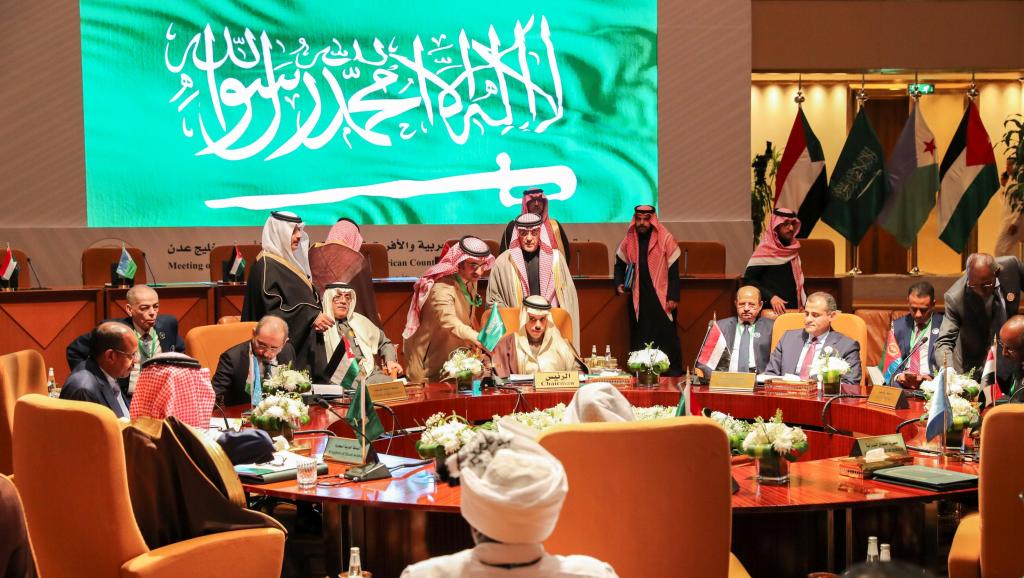Council of Red Sea and Gulf of Aden to play critical role
https://arab.news/6uzf2

Last week in Riyadh, the foreign ministers of eight countries overlooking the Red Sea and Gulf of Aden signed the charter of a new organization: The Council of the Red Sea and Gulf of Aden Countries. Its main objective is to enhance political, economic and security cooperation between its membership. In December 2018, Saudi Arabia launched this initiative to great applause, and the signing of the charter formalizes this gathering.
At the Riyadh meeting on Jan. 6, Saudi Arabia’s Foreign Minister Faisal bin Farhan stressed that the new organization will prioritize work to address “the threats and challenges facing our region, and safeguard the security of the Red Sea and Gulf of Aden.”
The safety of the two waterways and environmental protection are expected to figure highly in the new gathering’s scope of work.
The new organization, with such a wide mandate, is an important step forward to safeguard the security of the Red Sea and Gulf of Aden, which has not received the attention it requires.
About 230 million people live in the littoral states of the Red Sea and Gulf of Aden. They occupy about 6.4 million square kilometers, larger than the area of the EU. However, their combined gross domestic product is only about $1.2 trillion, with Saudi Arabia contributing more than 60 percent of that total.
The new bloc’s member countries have traded for thousands of years, but trade between them has recently shrunk and investment has suffered. Some are fragile states that have experienced wars, internal conflicts, poverty and an acute governance deficit. Economic development has been negatively affected by those challenges, and investors have fled. As a result, terrorists, pirates and organized crime have taken advantage of the power and economic vacuums prevailing in some parts of the region.
The Red Sea stretches between two important narrow passageways — the Bab Al-Mandab Strait and the Suez Canal, through which about 10 percent of world trade and 4 million barrels of oil pass daily. But they also represent possible chokepoints, especially the former, should they be blocked.
Security threats to the region include drugs and human trafficking and arms smuggling, especially by Iran and its proxies. Those threats are magnified by the presence of many ungoverned spaces and the limited capacity of security forces because of a lack of resources and technical expertise to deal with emerging threats.
Promoting trade and investment between the Red Sea’s two shores should be a priority. Although about a tenth of world trade passes through the Red Sea and Gulf of Aden, relatively limited trade takes place between the countries overlooking them.
Only investment can create jobs and provide the youth with viable alternatives to illegal activities, but promoting investment faces formidable governance challenges, which need to be addressed candidly and robustly.
International aid donors give generously, but there is very little coordination between them to focus aid on addressing technical capacity limitations and governance. Development aid should work to help local communities build a more hospitable business environment, but should not be looked at as an alternative to private investment.
There needs to be better coordination between humanitarian aid providers to target the most vulnerable communities and deprive terrorists of the ability to control aid or direct it to serve their objectives.
All these challenges and the task of meeting them await the new council. And there are surely more. As a new regional organization, it should start slowly and decide on key priorities. It should also take advantage of willing partners in the region and beyond.
Regionally, the Gulf Cooperation Council (GCC) is best placed to play a key role in supporting the new group, at least by providing a model and instruments of integration, and possibly more. Most of the members of the new group are members of either the Intergovernmental Authority on Development (IGAD), the Common Market for Eastern and Southern Africa (COMESA) or both and could facilitate cooperation with these two important regional organizations.
The EU, UN and World Bank are all keenly interested in this region and the new group could enhance its effectiveness by including them as observers or strategic partners.
Over the past year, international and regional think tanks have taken an interest in the Red Sea and Horn of Africa region and could provide practical ideas for the new organization to consider.
Saudi Arabia has, for some time, advocated greater cooperation between the Gulf region and the countries overlooking the Red Sea and Gulf of Aden. At the GCC, Saudi Arabia was pivotal in the adoption of a wide-ranging framework for engagement between the two regions, which includes political, security, economic and cultural dimensions.
Promoting trade and investment between the Red Sea’s two shores should be a priority.
Abdel Aziz Aluwaisheg
The new organization should leverage the interest of regional and international organizations to create new and workable programs. On the political and security tacks, for example, the new council should build on the inroads made by Saudi Arabia to reconcile Ethiopia and Eritrea, as well as Eritrea and Djibouti, and the case of Sudan, where economic and political support have helped the country to stabilize.
Greater trade and investment flows are obviously the key requirement for long-term stability, peace and prosperity. The new organization should utilize trade facilitation instruments, which have been highly developed by international and regional organizations. To attract investment, countries need to improve governance, fight corruption and provide a more consistent legal environment.
And the new organization’s focus on the environment will be met with enthusiasm by international and regional organizations concerned by marine pollution and climate change. They would be willing to provide support in this area.
- Abdel Aziz Aluwaisheg is the Gulf Cooperation Council’s assistant secretary-general for political affairs and negotiation, and a columnist for Arab News. The views expressed in this piece are personal and do not necessarily represent those of the GCC. Twitter: @abuhamad1










































